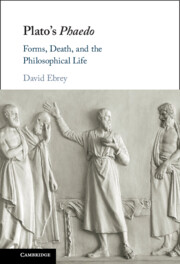Book contents
- Plato’s Phaedo
- Plato’s Phaedo
- Copyright page
- Dedication
- Contents
- Acknowledgments
- Introduction
- 1 The Characters
- 2 The Phaedo as an Alternative to Tragedy and Socrates as a Poet
- 3 Defense of the Desire to Be Dead
- 4 Cebes’ Challenge and the Cyclical Argument
- 5 The Recollecting Argument
- 6 The Kinship Argument
- 7 The Return to the Defense
- 8 Misology and the Soul as a harmonia
- 9 Socrates’ Autobiography
- 10 Cebes’ Objection and the Final Argument
- 11 The Cosmos and the Afterlife
- 12 The Death Scene
- Bibliography
- Index Locorum
- Index
5 - The Recollecting Argument
72e–77d
Published online by Cambridge University Press: 02 February 2023
- Plato’s Phaedo
- Plato’s Phaedo
- Copyright page
- Dedication
- Contents
- Acknowledgments
- Introduction
- 1 The Characters
- 2 The Phaedo as an Alternative to Tragedy and Socrates as a Poet
- 3 Defense of the Desire to Be Dead
- 4 Cebes’ Challenge and the Cyclical Argument
- 5 The Recollecting Argument
- 6 The Kinship Argument
- 7 The Return to the Defense
- 8 Misology and the Soul as a harmonia
- 9 Socrates’ Autobiography
- 10 Cebes’ Objection and the Final Argument
- 11 The Cosmos and the Afterlife
- 12 The Death Scene
- Bibliography
- Index Locorum
- Index
Summary
This famous argument is important for understanding how, according to Socrates, we can inquire without the senses: the knowledge is already within us; the senses are merely necessary for triggering the beginning of inquiry. I argue that Socrates treats recollecting as an extended process. His claim is that learning is a type of recollecting that begins when we first perceive something and continues until we acquire knowledge of the relevant form. Moreover, I argue that Socrates is interested in a type of recollecting that involves perceiving one thing and bringing to mind another, which is the very standard by which one can judge the first. Socrates does not provide here an argument for accepting “Platonic forms,” where these are understood as including all of Plato’s central commitments about the forms. Instead, his argument highlights one key difference between ordinary objects and forms: that the latter do not change over time, whereas the former do.
Keywords
- Type
- Chapter
- Information
- Plato's PhaedoForms, Death, and the Philosophical Life, pp. 100 - 130Publisher: Cambridge University PressPrint publication year: 2023

